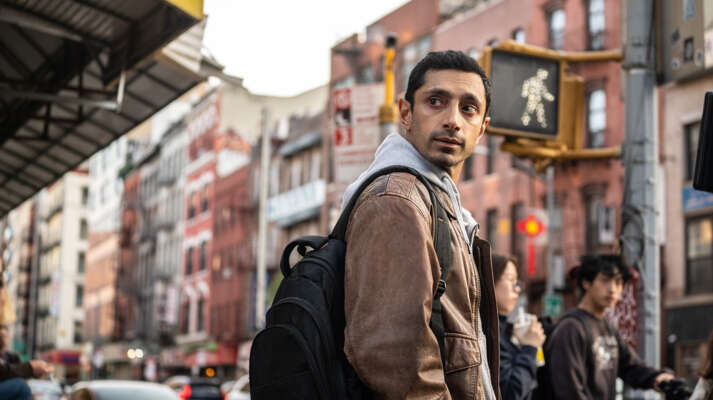An Interview with Dr. Nicole Apelian
We speak with the survival skills consultant for Leave No Trace
An Interview with Dr. Nicole Apelian
By Peter Bowen
In Debra Granik's Leave No Trace, a father (Ben Foster) and his daughter (Thomasin Harcourt McKenzie) create a hidden home in the middle of Portland's Forest Park. For Granik, "Tom and Will are part of a subculture built around the preservation and practice of primitive skills." Knowing how to forage, how to raise food and gather water, and how to detect outsiders are the basic skills the father and daughter have acquired to survive in the wild. To get the details right, the filmmakers reached out to Dr. Nicole Apelian, a Portland local who has been practicing and teaching both survival skills (how to stay alive in the wild) and primitive skills (how to live in the wilderness) for years. Having worked with Botswana's San Bushmen in the wild, Apelian imported her knowledge to the States where, among other things, she appeared as a contestant on the History Channel's show Alone, surviving on Vancouver Island for 57 days with nothing more than her knife and know-how. We spoke with Apelian about how she got involved with the film, her experience with teaching skills, and what the film tells us about the benefits of living in the wild.

How did you get involved with Leave No Trace?
Through a friend who'd worked on Winter's Bone. In 2016, Debra Granik and [screenwriter] Anne Rosellini were looking for a skilled person in the Portland area. When we met for dinner, they gave me a copy of the script. They wanted to know how to make the movie authentic. During our conversation, they were scribbling down a lot of notes, so many that I remember them spilling over onto a napkin. During that dinner, we decided that we wanted to work together. The sent me a final script, and I gave them extensive notes about how to make things authentic. When they came back to Portland to shoot in 2017, I came on to train the actors and review the script once more. I also worked with props, set design, and green design.
How did you work with the actors?
I did a range of things from working on physical movements-what someone would do in a wilderness living situation or survival situation-and looking at Ben Foster's character as someone who'd been in the military. There's a psychological link between wilderness living and living with PTS. With Ben and Thomasin, I trained them both in survival skills and wilderness living skills. At the beginning of the movie, the characters are living fairly harmoniously in nature in Forest Park, an outdoor space about 5,100 acres, or twelve times the size of Central Park. It is a place you can get lost in and actually live off the grid as they did. I wanted to show how they could live in this situation-and live well. The actual father and daughter lived off the land quite well. I wanted to lend that level of authenticity to the actors, so it seemed they had been doing these skills for years. They learned everything from bird language and nature awareness to tracking and building shelters.
What was it like working with actors?
Both Ben and Thomasin Mackenzie really took to survival skills. They did homework even before I met them. In addition to traditional skills, we worked on the psychological skills. How do you hide in plain sight? How do you hide when you go from the wilderness to being with people so you won't be noticed? That was very important to these characters.
You've been teaching survival skills for nearly two decades. How did you get started?
As a child, my parents could never keep me indoors. I had a bug collection, a bird's nest collection, a shell collection-anything from outside. My stepfather really fostered my love for nature. He would come home early from work as a chemistry professor and take me canoeing or hiking with a field guide and binoculars. I went into biology for undergraduate and graduate school. In the mid-nineties, I moved to Botswana in southern Africa with the Peace Corps. There I worked as a game warden for the Wildlife Department and after that, I did lion research. I was in the middle of nowhere with no electricity, no running water, nothing. When I was living in the bush in Africa, I honed my skills, including tracking, bird language, nature awareness, and nature connection (which is connecting with individual animals as well as the ripple effect on the world around them.) There is a lot of bird language in the film. Early on you see Ben Foster's character listening and noticing how the birds are alarmed, meaning other people are around. When I was in Africa, I connected with the Kalahari Bushmen, who are arguably the most talented hunter-gatherers on the planet. They taught me about "hard skills"-how to start a fire by friction, how to tan an animal, how to make the land your grocery store and pharmacy. When I moved back to the Pacific Northwest, I started practicing and teaching those skills.
Do you find a physical or emotional connection to the wilderness?
I was diagnosed with multiple sclerosis in 1999/2000. I went downhill very quickly, but being in nature has been my biggest healer. Spending time in nature, doing skills, using natural herbs-I'm an herbalist as well-has been so important. Really just being off the grid, not being on my phone or computer, and being mindful and grateful for what's around me. I tried to pass those skills on to Ben and Tom. Ben told me one of the biggest things that connected him to Thomasin as a father and daughter was doing skills with me. When you do skills with someone, you connect to yourself as well as connect with others and nature. With those three things, you can really be a joyous, happy person. When Ben and Tom did those skills for me, they re-connected to each other, to nature, and to themselves.
Your fellow Alone contestant Justin Vititoe founded Hike 2 Survive, which helps veterans cope with transitioning to civilian life through wilderness expeditions. What's the connection between PTS and survival training for you?
Wilderness living and nature connection helps anyone who's been through any sort of trauma, especially PTS. After the death of my oldest son, nature was my biggest healer. Justin had told me a lot about how being in nature is a really great way to help alleviate a lot of the symptoms of PTS.
The father's desire to be alone with his daughter in nature would make sense then, especially if he's suffering from PTS?
It makes perfect sense. What comes through so clearly in the movie is how Ben Foster's character deals with his PTS by living off the grid in the woods with his daughter. He figured out that living in nature is what he needs to have a fairly healthy, happy life. To me, this speaks to a bigger issue of how we live in the modern world, closed in by four walls. We are not evolutionarily designed to live that way. I live in a house, but I live in the woods very purposefully. Right now I'm sitting on my front porch and I'm looking out on this vast beautiful meadow with woods surrounding it without a soul in sight. That makes me psychologically and physically healthy. I think that Ben Foster's character had really figured that out.


